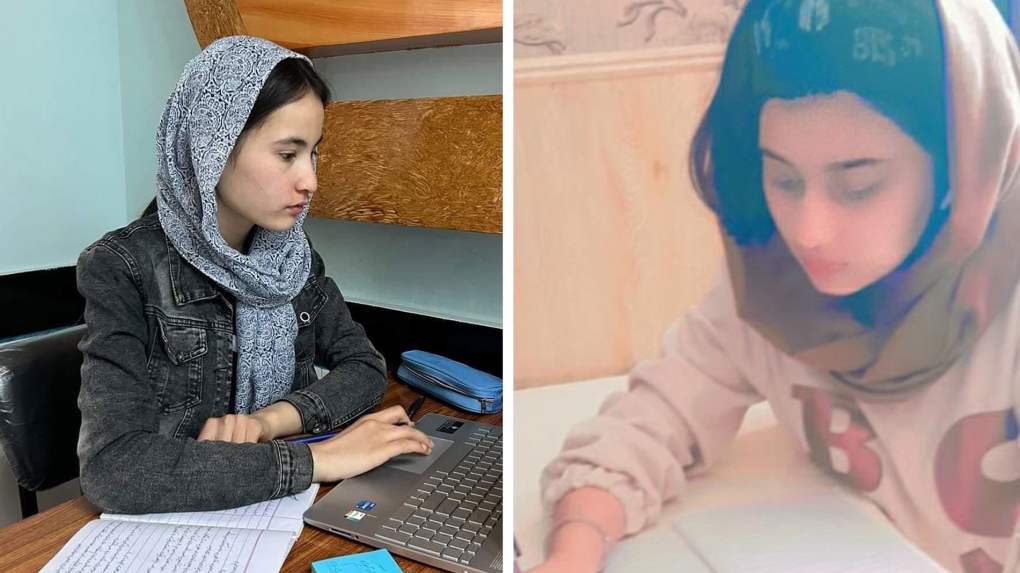
It was unusual for Nargis Masoud’s mother to let her stay awake after 9 p.m., otherwise the Grade 9 student might be late for school the next day. But on March 23 last year, Nargis stayed awake all night, crying.
Nargis’s mother informed her earlier that day the Taliban had banned girls from attending school in Afghanistan beyond sixth grade.
“I felt heartbroken, and I cried all night. It was like I was not supposed to meet my classmates and teachers again.” Nargis said.
Three million girls have been deprived of secondary education since the Taliban seized control of Afghanistan in August 2021, according to UNICEF. The regime has also banned women from attending university as well as working many jobs.
“Education is our right, if the Taliban do not let us go to school and continue education, our future will be dark and our country will not improve,” said Nargis.
But flickers of hope remain. Unable to attend classes in person, the 15-year-old now benefits from an online school established by a group of volunteer education activists from her hometown of Kabul.
“We have given priority to students higher than Grade 6 and those who’ve been banned from going to school in and out of Afghanistan. Those who are in refugee camps – boys and girls – can attend, but in Afghanistan, only girls can join,” said Shakardokht Jafari, one of the organizers of the Education Bridge for Afghanistan (EBA) online school.
Jafari, who is based in London, U.K., says the reason for establishing the online school is to help girls in Afghanistan continue their education.
It’s something she cares about deeply. Jafari was six years old when her family was forced to leave Afghanistan for Iran during the war against the Soviets. In Iran, when she turned 14, her father insisted she get married instead of go to school.
“I was lucky that our school principal in Iran mediated and convinced my father to let me continue for one more year,” she said. “When I got permission, I went to the bookstore and bought books for two years.”
She ended up attending university in Tehran and earning a bachelor’s degree. Eventually, she went on to acquire a PhD in medical physics from Surrey University in the U.K., where she developed an innovative radiation measurement system to aid in cancer care.
Now, Jafari and the EBA team are trying to seek help from international organizations to create more space for Afghan girls who might benefit from online education. Currently, the online school only has capacity for 1,400 students, and is already full.
“We haven’t been able to pay our teachers and ask them if they can continue with us voluntarily. Only 20 of them agreed. It’s a big challenge,” said Jafari.
Although there are a lot of challenges, the EBA team tries to provide students with modern education and prepare them for international exams.
“When I joined, I thought this might not be the same as my usual school, but later I found it very helpful and I’ve learned a lot,” said Freshta Madadi, who along with her sister, Najia Madadi, attend online classes from a refugee camp in Pakistan. “The teachers are not focusing only on school subjects like math, physics … but they also take extra curriculum.”
Seventeen-year-old Freshta and 19-year-old Najia have been attending online classes since April. They started while in Afghanistan and have continued at the refugee camp, which has been their home for more than three months.
“I was at school when I heard that the Taliban is now in Kabul and everyone was scared and we were told to go home … it was the last day of school for us,” said Najia. “I had no idea what to do, it was kind of losing my way. After a while, one of my friends said there is an online school for girls that can help us with our studies. It was a kind of hope and a sense of happiness for me.”
Freshta says after the Taliban shut girls out of schools, she “repeatedly” went back to her teachers, asking them to let her sit in on classes, before realizing there was nothing they could do.
“It was very hard for us. So, we decided to leave Afghanistan and come to Pakistan. We had no other choice. We couldn’t go out freely, we couldn’t go to school or university,” said Freshta.
The Madadi family is waiting for documents to be processed in order to join their father in Australia.
Freshta says the online school provides her not only a good place to continue her education but an important platform where she can raise her voice and spread awareness about the situation of girls in Afghanistan.
“It is, of course, definitely, really sad for every single girl in Afghanistan, but it doesn’t mean that we give up. This is not the solution, we understand this. I know that every Afghan girl is brave,” said Freshta.